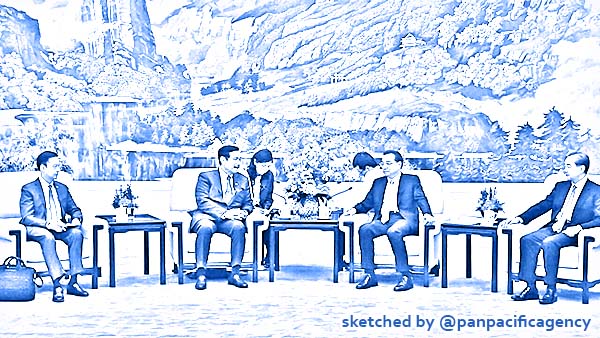China’s Belt and Road partners call for more cooperation on public health

Closer ties: Coordinating Maritime Affairs Minister Luhut Binsar Pandjaitan (second left) discusses with China Prime Minister Li Keqiang (second right) on the sidelines of the Belt and Road Trade and Investment Forum in Beijing, China. (Courtesy of the Coordinating Maritime Affairs Ministry). Sketched by the Pan Pacific Agency.
BEIJING, Jun 23, 2020, SCMP. Fair access to medical goods and services should be world’s top priority, say ministers from 25 nations linked to Beijing’s multibillion-dollar infrastructure development plan. Belt and Road Initiative has been hard hit by the global health crisis, with 20 per cent of projects ‘seriously affected’, Chinese official says, according to the South China Morning Post.
Senior officials from 25 nations involved with China’s multibillion-dollar Belt and Road Initiative have issued a joint statement calling for great cooperation on public health as the world continues to battle the Covid-19 pandemic.
Ensuring fair access to health products and services should be the world’s top priority, the minister-level officials said in a communique released by China’s foreign ministry on Friday following an international videoconference.
They also called for greater investment in “sound and resilient” health infrastructure – including the construction of regional storage centres for medical supplies – and committed to improving the availability and affordability of “products of reliable quality”, especially vaccines, drugs and other essential items.
Many projects under the belt and road plan – Chinese President Xi Jinping’s pet project to boost connectivity across Asia, Africa and Europe – have been delayed by the health crisis, due to Chinese labourers being unable to return to their overseas workplaces and disruption to the global supply of building materials and equipment.
Wang Xiaolong, director general of the international economic affairs department at the foreign ministry in Beijing, said that about 20 per cent of belt and road projects had been “seriously affected” by the pandemic, though he did not give any examples.
Of the remainder, 40 per cent had experienced only a mild impact, while 30-40 per cent had been moderately affected, he said, citing figures from a ministry survey.
No major projects had been cancelled, Wang said.
In their statement, the 25 ministers promised to do all they could to provide medical support to foreigners affected by the pandemic within their jurisdictions, including frontline medical staff and those working on belt and road projects.
More than 130 countries have signed agreements with Beijing to cooperate on the ambitious plan, which includes, among other things, railways, motorways, ports and natural gas pipelines.
According to China’s commerce ministry, in the first five months of 2020, the value of new contracts signed under the belt and road umbrella rose just 0.1 per cent from a year earlier to US$46.98 billion.
In the same period, the number of new workers sent by China to work on such projects fell by 42 per cent from the equivalent period of 2019 to 111,000, taking the total employed overseas at the end of May to about 658,000.
Several host nations have cut back their spending on belt and road projects to offset the economic impact of the Covid-19 pandemic.
Pakistan, for instance, has slashed its annual budget for the China-Pakistan Economic Corridor by a third to US$159 million, from US$241 million in 2019, according to a report by the Nikkei Asian Review.
Beijing said this week it would write off some of its interest-free loans to African countries that were set to mature before the end of the year to help them deal with the economic fallout from the health crisis.
Additional reporting by Reuters.